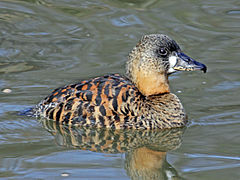White-backed Duck
| White-backed Duck | |
|---|---|
 | |
| Conservation status | |
| Scientific classification | |
| Kingdom: | Animalia |
| Phylum: | Chordata |
| Class: | Aves |
| Order: | Anseriformes |
| Family: | Anatidae |
| Subfamily: | Thalassorninae Livezey, 1986 |
| Genus: | Thalassornis Eyton, 1838 |
| Species: | T. leuconotus |
| Binomial name | |
| Thalassornis leuconotus Eyton, 1838 | |
| Subspecies | |
| |
The White-backed Duck (Thalassornis leuconotus) is a waterbird of the family Anatidae. It is distinct from all other ducks, but most closely related to the whistling ducks in the subfamily Dendrocygninae, though also showing some similarities to the stiff-tailed ducks in the subfamily Oxyurinae. It is the only member of the genus Thalassornis.
These birds are well adapted for diving. On occasions they have been observed to stay under water for up to half a minute. They search especially for the bulbs of waterlilies. From danger, they also escape preferentially by diving; hence, the namesake white back is hardly visible in life.
White-backed Ducks live in southern Africa, especially between Senegal and Chad in the west and Ethiopia and South Africa in the east. Their habitat consists of lakes, ponds, swamps and marshes where they are well camouflaged against predators.
There are two subspecies, Thalassornis leuconotus leuconotus and Thalassornis leuconotus insularis. The latter lives entirely on Madagascar and is considered to be endangered by hunting, habitat loss and the introduction of competing exotic species.
The White-backed Duck is one of the species to which the Agreement on the Conservation of African-Eurasian Migratory Waterbirds (AEWA) applies.
Woolaver and Nichols (2006) conducted a nesting survey of the Madagascar race in 2001 at Lake Antsamaka in western Madagascar. They found a total of 37, indicating the significance of this single site for the conservation of this insular subspecies. Young, et al. (2006) suggested that an earlier population estimate of 2,500–5,000 total birds in Madagascar (Delany & Scott, 2002) may be too optimistic. Its African population may be in the range of 10,000 to 25,000 birds (Kear, 2005)." (Johnsgard, 2010)

No comments:
Post a Comment